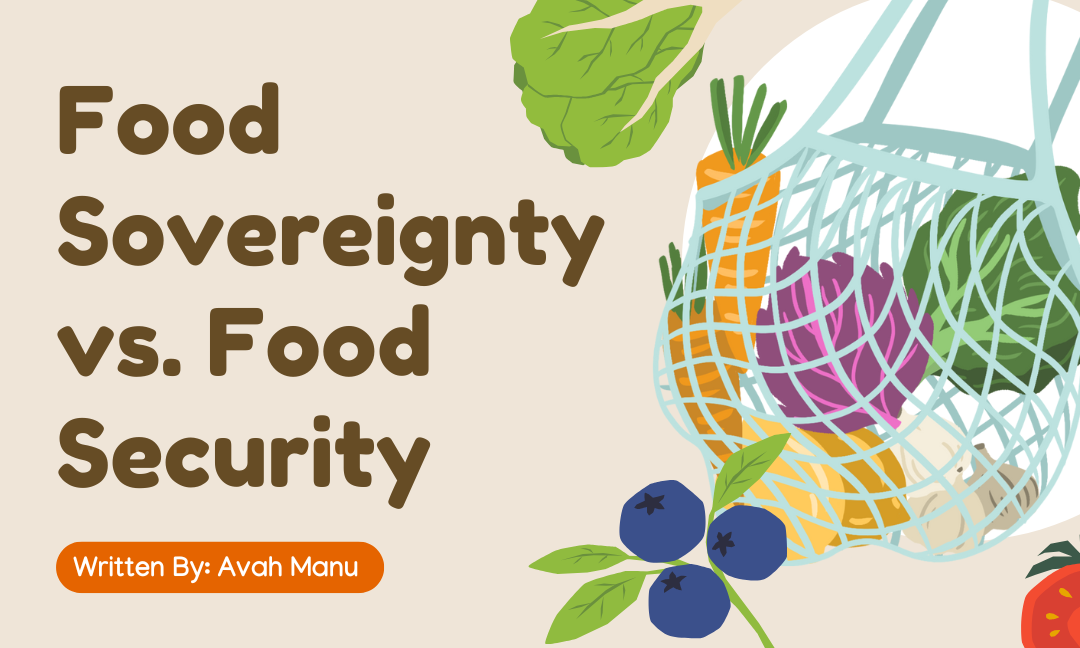Written by: Avah Manu
Edited by: Dhanika Botejue
Designed by: Alessa Zaitseva
Published by: Rayna Almas
Learn the definition of food sovereignty and food security, the differences and similarities between the two, and the importance of each.
Introduction:
Food sovereignty is the right for people to access healthy and culturally appropriate foods produced through sustainable methods. It emphasizes the importance of ecological practices and sustainable methods, giving local communities control over their food systems. Food sovereignty establishes a deeper connection between people, their food, and their land. It aims to prioritize empowering producers, distributors, and consumers, rather than catering to corporate interests and market demands.
Food security is defined by people having dependable access to nutritious and safe aliments. Reliable accessibility and availability to sustenance give communities sufficient resources to sustain their basic nutrition. A lack of access and stability to healthy food sources causes food insecurity. Those who suffer from food insecurity are prone to dying earlier, are malnourished, and are more likely to have chronic physical and mental health conditions.
The difference between food sovereignty and food security:
Food security wants people to have access to food but needs to distinguish how those resources are cultivated, who produces them, and how they will be distributed. This means that these foods can be produced and gathered by environmentally damaging and unsafe agriculture practices, like overconsumption.
On the other hand, food sovereignty emphasizes major issues like where our food is coming from and how it is produced, while still tackling food insecurity. Food sovereignty advocates for sustainable agriculture practices and for people to understand and take control of food systems, ultimately being aware and understanding where their food is made and how it is made.
More concisely, food security focuses more on the lack of healthy food communities, while food sovereignty is a sustainable and ethical approach toward food security that puts attention on our food systems and gets rid of power imbalances between corporations and local communities.
Importance:
Food security is important because it is a basic human right and a necessity to have access to healthy and nutritious foods. Not only that but lack of nutrition is linked to our long-term health, economic stability, and the environment. Food security reduces poverty and allows children to focus on their education and for adults to work effectively.
When we look back at Canada’s history, during the 1940s, Indigenous communities were distributed ration boxes called the five white gifts. In these boxes, milk, salt, white flour, lard, and sugar were found. Those ingredients are known to cause high blood sugar, diabetes, heart disease, obesity, and cancer which are growing in Indigenous communities. Indigenous people practicing food sovereignty is an act of resistance against colonial influences. The right to fish, hunt, and cultivate can reduce nutrition-related illnesses and can build a stronger connection to their environment and their culture for their community. Evidently, food sovereignty is important, because it empowers communities to take control of their own food systems, ensuring healthy and culturally appropriate food. It uses ecological agriculture, it protects local farmers, and reduces dependency on global markets.
Conclusion:
In conclusion, food security ensures that people have access to enough nutritious food, while food sovereignty focuses on how that food is produced and who controls the food system. Food sovereignty emphasizes sustainable farming, local control, and fair practices, aiming to reduce corporate influence. Both are important because they work together to ensure people have healthy food, but food sovereignty goes further by empowering communities and promoting long-term, ethical solutions for food access.
Sources:
Food sovereignty:
https://www2.foodsecurecanada.org/who-we-are/what-food-sovereignty
https://usfoodsovereigntyalliance.org/what-is-food-sovereignty/
https://www.theindigenousfoundation.org/articles/indigenous-food-sovereignty
Food security:
https://www.worldvision.ca/stories/food/the-basics-of-food-security#1
https://www.thecanadianencyclopedia.ca/en/article/food-insecurity-in-canada

